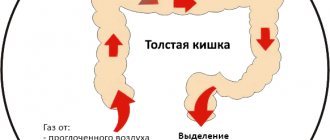Development mechanism
The abdominal cavity contains many nerve endings. They are responsible for the manifestation of pain, reactions to external and internal stimuli. Thus, a hard belly in a newborn can be caused by:
- inflammatory process in the tissues of one of the abdominal organs;
- muscle spasms due to psychological stress or diseases of the gastrointestinal tract;
- reflex tension due to the immaturity of the digestive system.
The causes of the problem are not always pathological. A hard belly in a newborn may be a reaction to air bubbles trapped in the intestines or a violation by the mother of the recommended diet. Immaturity of the digestive system most often manifests itself as intestinal colic or constipation.
Symptoms
Below we will try to deal with one of the fairly common childhood problems, which is bloating. This reason is often the main one that makes newborns cry desperately. Thus, the kids seem to signal to their mothers how bad they are now, and also ask for immediate help in resolving the problem.
Only after three months do babies begin to suffer less often from this problem.
The very sight of a baby suffering from colic can cause a state of panic in new parents. The main symptoms of colic are:
- The baby is screaming;
- Clenches his fists;
- Blushes;
- Kicks his legs;
- The tummy is noticeably inflated.
Although such attacks do not at all prevent the newborn from eating well and actively gaining weight. If the neighbor's grandmother tells mom that the baby will outgrow, you just need to wait, she usually calms down, although in vain. often signals a disease of the digestive system.
Intestinal colic
The problem is typical for most babies aged from 2 weeks to 3-4 months. Typical symptoms are facial flushing, moodiness, and crying. During spasms, the baby draws in his legs, straining the umbilical area.
Colic usually begins after feeding and lasts about 30 minutes. As a rule, they intensify in the evening.
This condition is not pathological, but is associated with incompetence of the digestive system. To relieve pain, the child needs warmth and peace. You need to pick him up and rock him; You can apply a diaper heated with an iron to your stomach or arrange a warming bath with decoctions of medicinal herbs.
To improve peristalsis, it is useful to give your baby a relaxing massage - with smooth clockwise movements. For severe cramps, you should consult your pediatrician. He will recommend drugs based on simethicone (Espumizan, Infacol), as well as folk remedies - dill water, fennel tea.
Why do babies' bellies swell and become rigid: symptoms, what to do
Fathers and mothers often encounter the fact that the child has a hard stomach, which usually indicates bloating (flatulence).
This fact itself often worries parents, since they cannot independently understand how dangerous this sign is. In turn, it can be both a consequence of diseases and a normal condition.
If your child's abdominal bloating occurs frequently, it is strongly recommended to consult a doctor.
Baby suffers from flatulence
Symptoms
If a child has a distended belly, this may or may not indicate digestive problems. Flatulence can be either spontaneous, caused by poor diet, or a manifestation of diseases of the gastrointestinal tract. If we are talking about ordinary intestinal colic in a baby, then this process is absolutely physiological in nature.
Baby before feeding
Important diagnostic criteria are accompanying symptoms:
- Feeling of heaviness in the stomach.
- Difficulty falling asleep or sleeping too little.
- The child has a hard stomach and pain.
- Reluctance to eat.
- Gases are difficult to pass.
- Weakness.
- Decreased function of the digestive system.
- Diarrhea.
There may also be hidden indicators of a child’s bloated abdomen, which only a doctor can determine.
How to recognize bloating
Intestinal colic in certain cases can last up to three months. They manifest themselves in the baby's face turning red, clenching his fists, tapping his legs and wanting to press them to his stomach.
Bloated belly in a child
Loss of appetite is often observed. When a mother tries to breastfeed her baby, a child up to one year old may either refuse it altogether or take only a few sips.
In older children, flatulence manifests itself more calmly, but this condition can still be expressed in loss of appetite, bad mood and insomnia. Children often complain of pain. In addition to a tight tummy, breathing may be difficult.
Causes of flatulence in a newborn
A child has a headache and stomach pain: possible causes
Why is my baby's belly bloated? When it comes to a newborn, the most common cause of bloating is intestinal colic. As a rule, they appear somewhere in the second or third week and last up to three months. This condition is not associated with illness. Its cause is an insufficient degree of development of the digestive system.
Laying on the stomach is an effective aid for colic
The cause of colic may also be that the mother does not follow a diet. During the first six months, her diet should be limited, because all harmful substances enter the baby’s body. The gastrointestinal tract of a child under one month is not yet mature enough to digest all this. Therefore, the stomach may become bloated.
Parent helps pouty baby with colic
Mom is strictly prohibited from smoking, spicy and salty foods, carbonated drinks, citrus fruits, sweets, and legumes. All of them can lead to flatulence in an adult with a developed digestive system. What to say about the child?
Not in all cases, the cause of colic is the mother's eating behavior. Given that the baby's gastrointestinal tract is still developing, colic will occur in any case. It’s just that a mother’s diet can alleviate or aggravate this condition. Bloating in babies can often occur in those who are bottle-fed.
Important! Before giving formula to your child, you need to make sure that it contains all the necessary microelements in the correct proportions, as well as its health benefits.
Possible diseases
A bloated abdomen can also indicate serious diseases, which include:
- Chronic diseases of the digestive system: gastritis, duodenitis, colitis and others.
- Acute respiratory viral infections. For example, with the flu, sometimes there may be bloating with diarrhea.
- Lactose intolerance. A very common reason why the abdomen may become bloated, which is especially dangerous in infancy.
- Intestinal infections. One of the most dangerous situations that can bloat a baby's belly.
- Appendicitis. This is one of the most dangerous conditions that make the stomach hard. It can kill a person in just a few hours. Also, with appendicitis there may be a temperature of 37-38 degrees.
First aid for colic
A child has a stomach ache and vomiting - possible causes of nausea and diarrhea
If a child has bloating, what to do in this situation? It is not possible to completely get rid of intestinal colic in a baby. And there is no need, since this is an absolutely normal phenomenon. But you can significantly alleviate the baby’s suffering. To do this you should do:
- Massage the tummy, carried out clockwise.
- Place the baby on his stomach.
- Tuck the baby's legs towards the tummy.
- You can significantly reduce pain if you place the baby with his stomach to the parent's stomach.
- Sing a lullaby or play “white noise” - a monotonous background sound (the noise of a waterfall, cars, rain, and so on).
It is also important to calm down yourself, because the negative emotional state of the parent is transmitted to the child. You can also feed in a different position or rock the baby. If none of the described methods helps, you can use a gas vent tube.
When to see a doctor
At least once a month you need to take your child to the doctor, who will examine him and determine whether everything is normal with him. Only a pediatrician can adequately determine the degree of danger of the condition, so if there is the slightest doubt, a visit to him is mandatory.
Constipation in a 7-11 month old baby - causes and types
For example, appendicitis can easily masquerade as an intestinal infection. It also manifests itself in the fact that the child has a dense stomach, and hours can count. Therefore, for your own confidence, you need to see a doctor immediately. When it is clear that this is normal colic, relax.
Important! It is strictly forbidden to self-medicate if the baby experiences prolonged loss of appetite, vomiting, and pallor.
Consequences of lack of treatment
It all depends on the reason that caused the colic. If we are talking about appendicitis or a severe intestinal infection, this can be fatal. If these are normal colics typical of newborns, they go away on their own.
Important! Parents need to be careful because sometimes the treatment prescribed by the doctor is excessive and leads to loss of money. Therefore, adults should always have their own health literacy. This does not mean that you need to give up visiting doctors.
Prevention
It is impossible to completely prevent intestinal colic in an infant, but a number of actions can significantly reduce their frequency and intensity:
- Correctly attach the baby to the breast. The baby should grasp not only the nipple, but also the entire areola.
- Overfeeding should not be allowed. You need to trust your child and focus solely on his appetite.
- After feeding, it is recommended to hold the baby in a column for 15 minutes.
- If the cause of colic is lactase deficiency, lactose-free mixtures should be used.
- Mom herself must eat right. Then the baby’s belly will inflate less, and he will cry less often.
If you follow these simple recommendations, it will be much easier for your child.
Intestinal colic is generally normal in infancy and does not need to be treated. In some cases, gases in an infant may indicate poisoning; this requires urgent treatment.
A hard belly can also be caused by appendicitis, which can kill a baby in a few hours. Therefore, at the first appearance of this symptom, it is recommended to immediately consult a doctor.
Tummy pain can also occur with other diseases of the digestive system.
Source: https://kpoxa.info/zdorovie-pitanie/u-rebenka-tverdiy-zhivot.html
Constipation
If your newborn's belly feels hard to the touch, it may be due to constipation. Stool retention usually lasts 2-3 days. In this case, bowel movement causes severe discomfort to the child.
Constipation in infants is not always a pathological condition. Sometimes it can be physiological. This is the medical name for a condition when mother’s milk is completely absorbed by the child’s body, so the formation of feces does not occur.
If constipation causes pain, stool becomes dry and hard, the baby needs parental help. He needs to be given a glycerin suppository or microenema. Your pediatrician may also prescribe lactulose-based mild laxatives.
It is equally important to identify the cause of constipation and eliminate it. As a rule, it is associated with poor nutrition of the mother, the beginning of complementary feeding, and changing infant formula. Less commonly, stool consolidation causes fluid deficiency in the baby’s body, dysbacteriosis and neurological diseases.
Symptoms in preschool children
In a 2-year-old child suffering from bloating, the following reasons come to the fore:
- consumption of large amounts of easily digestible carbohydrates: grapes, chocolate, baked goods, etc.;
- sedentary lifestyle;
- overweight;
- fermentopathy (insufficient production of lactase, which breaks down milk sugar);
- disturbance of intestinal microflora.
Similar reasons cause belching in a 3-year-old child, in addition to other manifestations of increased gas formation. But at this age, flatulence develops much less frequently than in children under one year old.
In a 4-year-old child, signs of flatulence appear from the first days of attending kindergarten. This is due to changes in diet, due to which the intestines undergo adaptation processes. A child’s hard belly, belching of air, and frequent passing of gases lead to stress, which in turn increases the process of gas formation.
In such cases, a mandatory consultation with a doctor is necessary to establish the causes of this condition and know how to deal with flatulence and bloating.
In a 6-year-old child, the causes and clinical manifestations differ little from those in the previous age category. May play a role:
- expansion of the diet, when more sweets and soda, raw vegetables are eaten;
- incorrect combination of products;
- chewing gum use;
- Great psychological stress and stress if the child starts attending school.
If a child develops a hard stomach and complains of rumbling, pain, and belching after eating, it is necessary to adjust the diet for gas formation.
Dangerous symptoms
You should call a doctor if you notice accompanying symptoms:
- increased body temperature over 38 degrees;
- incessant, causeless crying lasting more than an hour;
- painful reaction of the baby to touching the stomach;
- constipation or diarrhea;
- yellow-green vomit;
- manifestation of blood in the stool.
These symptoms indicate the development of pathological processes in the abdominal organs. They can threaten not only the health, but also the life of the baby.
Symptoms of bloating in a child
Regardless of what caused the bloating, the symptoms are the same.
Bloating in infants, young and middle-aged children may be accompanied by:
- feeling of a full stomach. At the same time, the child has not eaten anything for a long time;
- painful sensations in the abdominal area;
- the appearance of rumbling and seething in the abdomen;
- increase in abdominal size. He gets pouty
- belching and hiccups;
- unpleasant odor from the mouth;
- attacks of nausea, vomiting;
- hard belly;
- bowel dysfunction in the form of constipation or diarrhea;
- increased fatigue;
- decreased ability to work;
- decreased appetite.
Infants become restless and start crying for no reason. A baby with colic presses his legs to his stomach and releases gas. There may be paleness of the skin, the appearance of greenish mucus and foam in the stool. Sleep is also disturbed.
If one of the symptoms occurs, we can talk about the appearance of bloating. Some children may not feel any discomfort and feel quite normal. If several symptoms are observed at once, and the baby feels unwell, you should urgently consult a specialist.
Possible diseases
Severe tension in the abdominal muscles in a newborn is a symptom characteristic of the following pathologies:
- Peritonitis is a pathological condition in which purulent contents of one of the internal organs penetrate into the abdominal cavity. It is diagnosed by severe tension in the muscles of the anterior abdominal wall and pain when pressed. Urgent hospitalization is required.
- Appendicitis is an inflammation of the appendix, which often (80% of cases) leads to peritonitis in infancy. On the day of the onset of acute pain and muscle spasms, you need to show the baby to the surgeon.
- Intestinal obstruction. A condition in which the process of food passing through the intestines is greatly slowed down or completely stopped. Accompanied by bloating, tension in the abdominal muscles, and severe crying. In the absence of timely treatment, it leads to tissue necrosis.
- Strangulation of an inguinal or umbilical hernia. If the hernial sac is tense and you cannot straighten it yourself, you should urgently call a doctor.
The symptom may also indicate abdominal trauma, hemorrhage, acute pancreatitis, or pyloric stenosis. All these pathologies require immediate medical attention.
Possible reasons
The child's digestive tract is sensitive, the structures are not yet formed. The stomach, intestines and digestive glands are not adapted to digesting “adult” food, so improper nutrition provokes various disorders.
The transition to adult food should occur gradually.
Closer to the year, from 11 months, it is necessary to switch from homogenized food to pieces. This is porridge cooked with adapted milk, soup with pieces of vegetables, finely chopped meat. Before school age, special attention must be paid to the nature of food preparation so that there are enough pancreatic enzymes to break it down.
Symptoms of tummy troubles in children can be caused by:
- flatulence;
- constipation;
- excess sweet foods;
- allergy to milk.
Bloating occurs because air accumulates in the intestinal cavity and does not escape. Increased gas formation is caused by the intake of appropriate products.
This category includes legumes, cabbage, onions, pears, and apples. There is always some food left in the intestines that ferments . Sweets enhance this process. Bacteria feed on glucose, and digestion promotes gas formation.
Another reason for a bloated belly is constipation. If the food is predominantly solid in nature, then the feces are compacted in the intestines.
Even when the urge to defecate appears, difficulties arise, and intestinal peristalsis does not help release excess contents. If this does not happen for several days, then the stomach begins to ache, and when palpating along the intestines, pockets of compaction are identified.
In infants
A newborn's digestive tract is sterile; it will begin to be populated with flora in the following months, and by 6 months it will be able to move on to more solid foods. Until six months, the only food a baby should have is breast milk or an adapted formula.
During this period, the nursing mother must follow a strict diet with the exception of allergenic, fatty, spicy, alcoholic and gas-forming foods. If she violates the diet, then intestinal colic occurs.
In addition, due to immature digestion, children often experience infant colic. They begin at about 1 month of age and continue until 3 years of age.
The onset of each attack occurs in the evening and at night.
In a newborn, dysbiosis can be caused by lactase deficiency. Signs of this disorder are diarrhea with a characteristic sour odor, a bloated stomach, belching, and lack of weight gain.
Intolerance to cow's milk, which has a complex protein composition, is a common cause of bloating. Milk sugar is not digested and remains in the intestines, begins to ferment and cause symptoms of the disorder.
In older children
The appearance of inflammatory diseases of the digestive tract is not typical for young children. At an older age, after 3 years, a bloated belly can be a sign of dangerous health problems.
If parents do not pay attention to the child’s complaints, then abdominal pain can develop into peritonitis and intestinal obstruction.
A distinctive feature of this category of diseases is temperature. The child does not allow his stomach to be touched; applying cold brings relief.
Inflammatory diseases are accompanied by nausea, vomiting, and symptoms of intoxication. The baby is lethargic and refuses physical activity .
With intestinal obstruction, there is no stool for several days, and attempts to defecate cause significant discomfort.
When parents feel the stomach, it does not always tense under their fingers, although normally it should be relatively tight.
Appendicitis is characterized by pain in the right area of the lower abdomen. This disease can occur at any age.
Inflammation does not cause compaction of the abdomen, but if the purulent sac ruptures, the contents are released into the abdominal cavity. In this case, peritonitis occurs, the abdomen becomes hard and flat, like a board.
Treatment of bloating in children
If a newborn has bloating, what should you do? If the pathology is confirmed, then a number of therapeutic measures are prescribed.
Treatment is as follows:
- use of medications;
- diet adjustments;
- complete elimination of diseases that could cause bloating;
- use of traditional methods.
Drug treatment
For bloating in children, a number of the following medications are prescribed.
- Espumisan. The active components of the product absorb gas bubbles and are painlessly removed from the body;
- Activated carbon, Smecta, Polysorb, Enterosgel. These drugs remove toxins from the body and absorb remaining gas bubbles;
- Pancreatin, Mezim, Cocona. These are enzyme-type medications that improve the functioning of the intestinal tract.
If bloating is observed in newborns, treatment consists of using anti-colic drops. This group includes Plantex, Bobotik, SubSimplex.
Diet
When a child has a hard stomach and begins to swell, you need to pay attention to what he eats. If the baby is small and is breastfed, the nursing mother needs to monitor her diet. For older children, foods that cause gas formation are excluded from the menu. This includes cabbage, bread, semi-finished products, legumes, raw vegetables and fruits.
During the diet, the emphasis should be on porridge with water, soups, meat and fish dishes, boiled vegetable purees, baked apples and pears. You don’t need to completely give up sweets and starchy foods, but you should reduce them to a minimum.
If the newborn is bottle-fed, then you need to pay attention to the formula. There is no need to cancel it immediately. You should first consult a gastroenterologist about this. Perhaps you should give more water.
Traditional methods of treatment
It is not recommended to give medications to babies under one year old. Therefore, if possible, it is better to replace them with traditional methods of treatment. Decoctions for bloating and flatulence can be prepared from:
- dill;
- fennel;
- yarrow and mint;
- St. John's wort and dried grass;
- lemon balm and rosehip;
- thyme and calendula.
Breastfed and mixed-fed babies are advised to massage clockwise for colic. This improves the passage of gases and the functioning of the intestinal canal. You can try another method - apply a warm diaper or heating pad to your tummy. If there is a strong accumulation of gases, a gas outlet tube is suitable.









